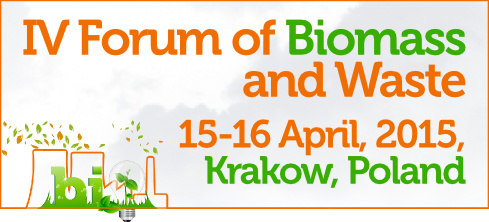

Even unsuccessful pilot projects are important in shaping of the mature market - potential of energy from waste against the background of the biomass sector
On April 15 this year took place in Cracow 4th edition of the Forum of Biomass & Waste. The event was organized by the CBE Poland team. The project was focused on the legislation, investments and technologies associated with the generation of energy from biomass and waste. The meeting was attended by nearly 300 participants representing various sectors of industry and industries related to the ecological production of electricity and heat.
Piotr Czopek, the Specialist in the Department of Renewable Energy of the Ministry of Economy had started the inaugural lecture recalling the definition of biomass, because, as it turns out, many companies understand different legal regulations clarifying the type of green fuel.
Representative of the Ministry of Economy reminded participants of the meeting that in accordance with the New Renewable Energy Sources Act, as a renewable energy source plant is called a system which consists a distinct set of: devices for power generation and for power output, connected to one place, in which electricity or heat are generated from one type of renewable energy, and is energy storage for storing generated electricity, and linked to it as a united group of equipment or buildings used to produce agricultural biogas, as well as an associated storage of agricultural biogas.
A new RES Act beside of restrictions, also introduced to facilitate the market
Piotr Czopek pointed out three facilities that were introduced in the RES Act. Firstly, the implemantation of a statements system which has the goal of improving the issuing of certificates of origin and improving the auction system operation. Declaration system is designed to eliminate the current, time-consuming administrative procedures related to the submission of appropriate documentation to the President of the Energy Regulatory Office (URE), in the course of the procedure of issuing certificates of origin, certifying, among others, adherence to a specific share of agricultural biomass in the entire fuel stream. The verification of biomass, bioliquids, wood, other than a full-fledged and substrates for the production of agricultural biogas, as well as a way of documenting the origin of the above fuels for the support system will be carried out in accordance with Regulation issued in accordance with Art. 119 of the Act. The extension of the obligation to purchase heat from RES and also the entire heat generated by waste incineration plants is define in Article. 116 par. 1.
35 years of ORC technology from the company Turboden
ORC solutions reduce staff costs and the costs of maintenance and these savings are for the period which may last for about 20 years - said Stella Bolognini, Sales Area Manager in Turboden Srl. Among the operating advantages, should be mentioned thath there is no need to hire additional staff, because for handle the ORC installation is only 1 person needed during 2-3 hours per week. Furthermore, Turboden solutions often do not require maintenance work on the turbine up to 20 years, and the steam turbine should renovate almost every year (renovation of the blades). Another advantage is the flexibility of the ORC – the plant based on this solution can work on 10% of the nominal power. In Poland, Turboden has installed its solutions in 11 investments, and 4 are currently under construction - all these investments utilize biomass, but the company also offers solutions dedicated to waste fuels.
Bolognini informed that the ORC unit offered by her company can produce hot water with temperature of 80 to 105 degrees Celsius, the then efficiency of power generation is approximately 18-20%. ORC solutions can be used in urban heating plants, sawmills, pellets or RDF or MDF production, and basically anywhere where hot water can be used for internal processes.
If there will be enouth fuel for constructed incineration plants?
Deputy Tadeusz Arkit, Chairman of the constant parliamentary subcommittee for monitoring waste management recalled that according to estimates in Poland is generated between 10 and 12 million tonnes of municipal waste. Approximately 30% of the stream should be procesed in waste incineration plants.The constructed plants capacity of processing waste is gauged for approximately 1 million tons per year, while the cement plants are able to use about 1.5 million tons, so it can be assumed that the waste remains for management fof6 -7 incinerator. Plants. Mr. Arkit drew attention to the fact that waste incineration plants have been identified as trans-regional, so not to make mistakes that lead to reduced levels of recycling. Into incinerator plants we should invest wisely, for example, should not be constructed two plants near the provinces border, in contrerary to Piotr Czopek opinon, accordig which waste should be enouht for ZTPO because the resulting projects are business plans Twhich were preceded by preparation and contracts. The problem may occur if in the future there would too many new plants. The currently constructed plants seem to be very well prepared.
Ryszard Gajewski, President of the Polish Chamber of Biomass stated that there is a problem with the municipal waste water treatment plants. Incinerator plants should theoretically be able to burn this type of waste, the question is when iwill be implemented so called Odor Act, which theoretically should be in 2016. Dr. Eng. Rafał Rajczyk a panel discussion moderator noted that now the unactivated yet incinerator plants representatives require from Regional Municipal Waste Processing Installations (RIPOK) long-term agreements for the supply of waste.
Grzegorz Żebrowski, Director of the Department of Commerce, EDF Poland SA said that in most cases we look on insinerator plants through the prism of meeting all kind of requirements associated with waste management, it is worth to realize (already at the stage of designing of incinerator plant) that the incinerator plant in addition to the implementation of the basic objectives, is also a special player on the energy market - both the electricity as well as heating market. Heating market has usually local character, so on the supply side is usually not too many players. Considerable importance has therefore 116 Article of the new RES Act, which clarifies that 100% of the heat that is produced in the incineration plant on certain conditions has to be mandatory purchased. In Poland, the incineration plants will normally appear on the balanced markets, such as in Krakow. If there apper another entity that will produce heat for the system, then someone in the system will have to produce this heat less. If the tariff for heat is to cover fixed and variable costs at certain volume, for the existing manufacturer appearance of the next player indicates an increase in fixed costs, resulting in pressure to raise prices, so the end-users should pay for everything. If the price of heat generated by incineration plants is very low - about 50% of the average price of the system, the price for end-user should not change.
Żebrowski stressed that we should look at incineration plant and at co-operation with the incinerator plant not from the perspective that it should to be the center of the heating system, beause it might led us astray. Apart from the security of the system, integrated market prices can make that for incinerator plants, at selected times, will be more rewarding to work in condensing mode and not in full cogeneration.
Over the network safety and balancing should watch the operator. The new regulation prevent a situation in which renewable energy source with a power of 10 MW will make 50MW coal-fired power plant unprofitable and this plant will have to be closed.
Piotr Czopek reminded that the waste incineration plant, which will be built by the end of this year will be able to gain the support in the form of green certificates in rage of 42%, accordingly to the Regulation of the Minister of the Environment. If this type of installation will run only from January 2016, accordingly to 39 Article of the RES Act it has to be examined whether the installation does not get over-support. There may not be a situation in which the installation will receive a refund at the level of 30-40%. If value of grants and revenues associated with the receipt of the waste, etc. will be higher than the permissible public support, then this installation sadly can not benefit from the support system for renewable energy.
Ryszard Gajewski said that the biomass market main problem is the import, because the biomass should be used locally and that should be repeated like a mantra. Meanwhile in Poland is still a very large volume of imported biomass.
Last year in Poland, from 13 million tons of biomass, which had been transformed into electrical energy, almost 60% were burned in dedicated boilers, and the rest was used by co-firing. It has to be noticed that this bad co-firing was ended a long time ago, now we have co-incinerating units with dedicated and modern l feeding biomass lines, by what the losses known from former co-firing are no longer present. From 19 thousand MWh of produced electricity half is from biomass, because it's the most stable source of renewable energy for electricity generation.
Old and simple co-firing was required for creating current biomass market
Żebrowski added that bad co-firing resulted from the fact that you have to start from somewhere. Biomass market in Poland wouldn't develop if there isn't a simple co-firing, which does not require many financial resources, doesn't generate a great risk and gave the opportunity for the market development, which has now reached a large size. This is, of course, the history now. In Żebrowski' opinion from 1st January 2016 the RES Act will rcause that simple co-firing will be unprofitable. In the energy mix we will have a biomass plants and dedicated multi-fuel plants, as a simple co-firing plants due to the reduction of support will not be profitable. This is a step in the right direction. Expert representing the company EDF believes that the new support system in the form of an auction will reduce many of the risks and cause in practise that rate of returns will be lower, which is consistent with the standards of the economy - the lower the risk, the lower profits you can expect.
Ryszard Gajewski stressed that the great success of the RES Act is the fact that they manage to push through a third system of support, the support for prosumers. The expert said that the safest is that, what is scattered.
In the RES Act is lack of real support for biomass which would be used strictly for heating - called Prof. Assoc. Andrew Szlęk, Director of the Institute of Thermal Technology, Silesian University of Technology. The smaller is the scale of biomass plant, the more it pays off to use these fuel for the production of heat than electricity. Renewable energy is to eliminate the use of exhaustible and emission fossil fuels, so it basically does not matter whether we replace fossil fuels with biomass in the production of electricity or heat. The use of biomass for heating purposes seems to be more reasonable choice because local biomass should be used locally to avoid absurdities, with which now we have to cope - to Silesia region trucks brings biomass, and from the other side goes to farmers coal because it is cheaper in individual use.
Municipality Złoczew is satisfied with the biomass heating plant built the last year. It is planned to expand the system, because the production is effective!
In 2012, the district heating infrastructure was far from satisfactory. For technical reasons, the city was in danger of switched the urban heating plant off - said Wiktor Płóciennik, Manager of Development, Municipal Affairs and the Environment in the City Hall in Złoczew. Due to the ambient conditions, it was necessary to define the project so it would be the less burden to Złoczew's municipal budget and that was the main reason that pushed to decide on the use of biomass for heating purposes.
When defining the design, was made decision about replacing the heating network throughout the city and the construction of a new source of heat from biomass with a capacity of about 2.8 MW. The problem was the condition of the municipal budget, but with the help came the Regional Fund for Environmental Protection (WFOŚiGW) in Lodz. The entire project cost approx. 9 million, the municipality gave the 20% of this amount (1.8 million PLN), the rest was subsidized.
General designer and contractor, appointed though tendering procedure, decided on Herz boilers - 2*1MW + 800kW pincinerating pellets or wood chips. In addition, solar panels were installed for drying the stored wood chips. Design works began in March 2013 and ended in December 2013. Building permission was achieved in the first quarter of 2014, when the contractor immediately began to build, and the whole process was completed in October 2014 and it was possible to start operating the new heating system from the begining of heating season. Currently, it is planned to expand the system with additional MW of thermal power, because we see that the solutions are effective. Exploitation is providing by urban public utility company in behalf of which Wiktor Płóciennik invited interested persons to visit the plant in Złoczew.
Are cyclones able to compete with more expensive electrostatic and bag filters?
Pedro Ribas Araújo, CEO of Advanced Cyclone Systems, said that ambition of the company led by him is to achieve the total capture of fine particles only with cyclones systems by continuously investing in innovative solutions and conducting ongoing research. Expert demonstrating various computer simulations showed that numerically optimized cyclones (known under the trade name as Hurricanes) and ReCyclone® systems are incompatible with the general thinking that cyclones are inefficient dust collectors.
Cyclones systems produced by ACS are able to replace the bag filters in many demanding operating processes that help meet the requirements of the MCP Directive and other demanding environmental standards for plants using different kinds of solid fuels, including coal and biomass. Solutions offered by the company can be compared to electrostatic and bag filters, but the investment and operational costs are much lower.
Energy production in conjunction with the annihilation of waste as a pillar of sustainable development of the city
Our company sells waste annihilation service. For one tonne of waste plant gets between 50 and 80 euros – so called "fee at the gate" and tin taht way we gain about 1/3 of our profits. What will happen next with the waste remains is the responsibility of our company, "- said Wlodzimierz Winkler, Chief power engineer in Uppsala heating plant iowned by Vattenfall AB. Of course, for the plant is also important the production of energy for the city, not only for households, the plant produces process steam, which is sold to local pharmaceutical industry.
To Uppsala Vattenfall comes approx. 120 thousands tonnes of waste per year, because it pays off to import high-calorie waste, eg. From UK. "Thaks to high-calorie waste the equipment works better and conversion ratio of waste for energy is increasing" - said Winkler. Note, however, that about 20% of the waste comes from incineration process and it is side product which should be deposited in special landfills – so a vision of a zero-waste society is so far utopian. Winkler said that part of the post-combustion waste can be used as a filling for the construction of large factories and then it is possible to negotiate a free of charge get rid of unwanted residues. "The second fuel used in Uppsala is peat. Peat ash has very good insulating and stabilizing,characteristics, so on these ashes Vattenfall simply earns profits" - noted representative of Vattenfall.
Currently, in order to reduce peat incineration, which is treated somewhat in the Union as a fossil fuel (transitional phase between biomass fuel and fossil fuel), in Uppsala is be to built the new biomass heating plant. Winkler drawed attention to the fact that the Vattenfall local operations must have high ratings and comply with group global thinking that operates in the international market.
Sustainable energy system for the city of Uppsala is on finding solutions that will able to work incinerator plants throughout the hole year, even in the summer. One of solution is to find additional use of heat, and in particular that, for example, reducing the electricity consumption in order to increase the thermal load. One idea is to provide housing in the washing machine supplied with hot water in order to not have to heat the water electrically. Furthermore, in order to save the energy, plant sells cold produced from central heat to office buildings, hospitals, pharmaceutical production plants. Incinerator plants should be located close to heating network - Winkler recalled.
The expert said that if in Poland would fbe lack of municipal waste for combustion, it is possible to adapt the part of plants for combustion of industrial waste. It should be noted that the more mature markets also face different environmental problems associated with green energy production. One of the mistakes that made the Swedish rational thinking, was the construction of incinerator plant in 2005, which did not allow the generation of electricity. The company's management had limited the amount of investment funds, as in the era of cheap electricity adding 15 million seemed irrational - the decision was simple. Two years later it turned out that there was a new law implemented by the department of energy and the environment, according to which, the new incinerator plants built after 2000 without the installed capacity of cogeneration, will be charged with a tax for the production. This tax for the plant in Uppsala was 6 million Euro per year. To invest in new facility would pay back therefore, in less than three years, so the decision was made to build. The conditions were difficult, because at the built before incinerator plant there was no extra space, so the low-pressure turbine and the generator had to be located on the site of the old plant. The new plant is not profitable, but improves the thermal balance - you can take greater amount of waste, and 1/3 of the profits comes from fees at the gate.
The most dangerous waste is bag and electrostatic filters - they also need to be somehow managed, like the ashes after burning peat, which in Uppsala has been successfully reduced by limiting the amount of peat and increasing the amount of waste incineration. The representative of the plant in Uppsala said that when there is a bog is not moved there is CO2 emission, but also absorption, but more important environmental aspect is the release of methane during the peat harvest. Methane is eight times more dangerous for the ozone shield than CO2.
At the end of his presentation, the representative of Vattenfall talked about two very important issues closely related to the needs of the city - on the visual qualities of individual plants, accompanied by architectural competitions and energy security, which are an important element of plants based on gas turbine and jet fuel fired.
Polish incineration plants investments soon begin production of energy
"Incinerator plants are an important link in the integrated waste management, but they are also an important link in the energy system, for providing cheap energy" - said Marta Gurin from CEWEP (Confederation of European Waste-to-Energy Plants).
"We predicted that after the entry of the Waste Act in 2013 amount of municipal waste will increase, and in Cracow waste amount is decreasing" - said Jakub Bator, Board Member, Development Director in Krakowski Holding Komunalny SA. The expert pointed out that the big problem for investors is the definition of recycling. Is the recovery of energy from waste can be considered as recycling? So far, unfortunately, we can't, but perhaps these rules will change - said Member of the Board of KHK.
Gurin recalled that in the EU are ongoing discussions on the revision of the directives on waste management, ie. Circular Economy package (closed-circuit economy). The discussion about the integration of the entire economy in the context of higher levels of recycling. The proposal, which had previously been proposed by committee, was abandoned, as the threshold of 70% recycling is not feasible - even for the Member States the best in recycling.
"The main benefit to be achieved by the construction of incinerator plants, will be landfills extinction" - says Bator. The representative of KHK also added that with the incinerator plant will produce roughly as much electricity as to keep the movement of trams in Krakow. It is obvious that, in comparison to EDF and CEZ plants, this incinerator will produce a small amount of power, but the main purpose of incineration is getting rid of the waste.
Walenty Twardy representing the consortium responsible for the construction of incinerator plant in Konin announced that construction of the plant is already at the finish and not there is no slightest risk of not meeting the deadline. The expert said that the bane of the tendering system in Poland is putting the main emphasis on the criterion, which is the price. Reluctantly, other indicators are used. With the investment should be taken into consideration technical aspects and it is technical conversation should settle tenders. Environmental, energy efficiency and technological solutions should be the basis for the allotment.
Heating sector faces the challenge of adapting to the new standards, which set the IED Directive. In Olsztyn were analyzed various options to fund new fuel source because of Olsztyn heating demand is more than 2 million GJ per year and over 150 km of network. Analysis centered around gas and biomass, but it turned out that in Olsztyn are large possibilities to convert the combustible fraction of municipal solid waste. In the region of Warmia and Mazury will be produced approx. 85-90 thousand tons of alternative fuels (RDF), it was therefore decided that it is worthwhile to combine the need for heating, together with the need for municipal waste management - said Lidia Warnel, Proxy and Project Team Leader, Municipal Thermal Energy Ltd (Miejskie Przedsiębiorstwo Energetyki Cieplnej Sp. z o.o) (MPEC) in Olsztyn. A representative of the MPEC in Olsztyn added that the current competitive dialogue is conducted with five partners, since the project will be implemented in the PPP (Private Public Partneship). By the end of the year should be decided on a business partner and signed a contract for private and public private partnership. The incinerator plant should be built in 36 months, and in the meantime, there will be in the same project, an existing facility Kortowo modernization, in order to adapt it to the new emission standards. Completion of the project is scheduled for the 2020-2021 year (deadline is 2022 years).
Waste incinerator plants are built for 20 or even 50 years, so you should think long term and use flexible technology, especially that the average calorific value of the waste over the years is changing - notes Barthélémy Fourment, Development Director, Tiru . The expert said that one of the Parisian incinerator plant, which converts 700 thousand tonnes of waste per year, has been running for over 40 years. A representative of Tiru suggests that the future potential import of waste may not be the best way for Poland, emphasis should be placed on research, so you can estimate the future trends in waste.
In the UK a few years ago was implemented a tax of 80 pounds per ton of waste storage - effectively encourages the use of the best forms of waste manegment. Fourment states that Poland should develop a long-term vision that will bring benefits to the local community and is well suited to the national grid. Of course, you can't predict everything for 30-50 years ahead, but you can think in ahead about the new-local consumers who collect eg. steam of lower temperature.
Energy from the ITPO as RES
According to the Regulation of the Minister of the Environment on 2 June 2010. (Regulation implementing the Law on waste), the requirements needed to qualify for the energy recovered from waste incineration as energy from a renewable source of energy, must be burned mixed municipal waste. Among other things, IGCP reported demands to extend this provision to include the directory and other waste - informed Maciej Szambelańczyk, legal counsel, WKB Wierciński, Kwiecinski, Baehr.
Currently, energy from waste that was treated as a renewable, must be burned mixed municipal waste containing at least one of the biodegradable fraction (permeate fraction of grain size 0 - 20 mm; kitchen waste vegetable or animal origin, garden and landscaping, wood, paper or cardboard, textiles, natural fibers, multimaterial waste, including waste of hygiene, skin). The waste must come exclusively from the areas in which, in accordance with the rules of maintaining cleanliness and order in the municipalities, are separately collected waste for other recovery processes, including recycling processes.
Under the current law, the lump-sum value share of the chemical energy of biodegradable fractions in the chemical energy of total mass of mixed municipal waste directed to the thermal conversion reaches 42% of the total energy recovered as a result of thermal conversion of waste. That qualifies the value of the energy recovered from thermal conversion of mixed municipal waste as energy made from a renewable source of energy. During his speech Szambelańczyk an interpretation of several controversial provisions in the Act, however, admitted that the discussion of the new law would require a dedicated, all-day meeting.
Quality test of solid biofuels and solid secondary fuels
Analyst of all solid fuels is heavily imposed by standards and norms, which facilitates our lives - Leokadia Róg, Head of the Department of Solid Fuels Quality Assessment in the Central Mining Institute (GIG). The content of solid components in the secondary fuels is practically not to designate, and such a problem is before an analyst. GIG representative reminded forum participants that the solid secondary fuel is a fuel made from non-hazardous waste in the processing and homogenization, in order to be used for energy recovery, which must meet the technical requirements of the classification and specifications listed in the PN-EN 15359: 2012. The solid biofuels (biomass) are substances of plant or animal origin that are biodegradable, derived from products, waste and residues of agricultural or forestry and related industries, as well as parts of other wastes that are biodegradable and meet the technical requirements of the classification and specifications mentioned in the PN-EN ISO 17225.
Dr. Róg said that in the future we are not able to pass the RDF tests, which is an ordered blend, however, of interest to all solid fuel testing laboratories will also be less homogenous secondary fuels. The mentioned fuel testing units should also adapt to heterogeneous test fuels having a calorific value of 6 to 16 MJ / kg.
On the market related to the biomass the energy industry with production capacity is pushed to the margin
In 2011, the company Malteurop won the competition of The National Fund for Environmental Protection and Water Management (NFOŚiGW) for Green Investment Scheme (GIS) decided to build theirown CHP plant for biomass. The project was completed in December 2013. The project is valued at approximately 30 million PLN. Investor managed to get a preferential loan for the amount of 11.9 million, and a grant in the amount of PLN 7.6 million. Malteurop due to the nature of production (the company produces malt) is a company in need of thermal energy throughout the year, and the difference between summer and winter heat demand is 10% - said Dariusz Tkaczyk, Proxy, Malteurop Poland Sp. z o.o.
The expert pointed out the absurdity of legislation which discriminates against auto-producers. To enjoy extra profits in the form of support, the company would have to sell all the energy and buy it later.
According to the proxy Malteurop biomass energy investments tend to be very cost effective as the underlying source of heat for the industry in need of low temperature year-round warmth. Perhaps the Ministry of Economy found that the effectiveness of such projects is so large that there is no need for further support. The expert also noted that cogeneration support system is too complicated, which leads to a situation in which the calculations and audits costs leading to an economic absurdity.
Article has been prepared based on the lectures and materials from the 4th edition of the international conference "Forum of Biomass & Waste", which was organized by a team of CBE Poland on 15 April this year in Krakow.
General partner of the event was the company Turboden, Strategic partner - Advanced Cyclone Systems (ACS). As an industry suppliers presented themselves at the event FUMAR and company Ropa Polska, which is the exclusive representative of the brand Albach in Poland, and as Exhibitors promoted their offers: BMH Technology, Falubaz Poland, Lodge Cottrell, GH Intertech and the International Flame Research Foundation (IFRF). The sponsor of the coffee break was the company Standardkessel Baumgarte belonging to the group JFE-Engineering.
Amoung the Honorary Patronage of the 4th Forum were: Janusz Piechociński - Deputy Prime Minister and Minister of Economy, Marek Sawicki - Minister of Agriculture and Rural Development, Marek Sowa - Marshal of the Malopolska region, Jacek Majchrowski - Mayor of the City of Krakow, and the Polish Chamber of Biomass, Polish Chamber of Waste Management, Recycling Polish Chamber of Commerce, Polish Biomass Association and the Lewiatan Confederation.
Simultaneous translation of the event was provide by company Bireta sc.
The media patrons of the 4th Forum of Biomass & Waste were: wyborcza.biz portal, monthly "Biomass Magazine", the magazine "Business & Ecology", quarterly "Paliwa i Energetyka" ("Fuels and Energy Sector"), the business magazine "Fakty" ("Facts"), oze.pl portal, as well as the portals: ekonews.com.pl, gramwzielone.pl, infor.pl, portalenergia.pl, ioze.pl, elektryka.org, biznesalert.pl, srodowisko.abc.com.pl, elektroonline.pl, inzynieria.com, energiamax.pl and srodowisko.pl.





























































































































































































































































































































